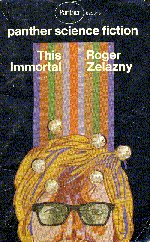
This Immortal
Roger Zelazny
187 pages
published in 1966
This Immortal is one of two novels which earned Roger Zelazny a Hugo Award, the second novel being Lord of Light. It got it in 1966, technically for the slightly different version serialised in the Magazine of Fantasy and Science fiction under its alternate title of ...Call me Conrad.
I think I may have tried to read this before, in a Dutch translation under its alternative title. At the time, I didn't succeed, probably because it was a lousy translation; Zelazny isn't the easiest sf writer to translate in the first place. Few Dutch translations of science fiction books are any good, so I feel justified in blaming the translator rather than Zelazny himself for his failure.
I have always read both new and old science fiction books, just reading what I found basically, but lately I've made a conscious attempt to read up on the "classics", of which this is one. Since it won a Hugo award, tied with Dune even, I had high hopes for This Immortal. I'm not saying these hopes were dashed, but I do think the reputation of this novel is somewhat greater than the book itself. Science fiction has moved on in the nearly forty years since this was first published and this feels somewhat old-fashioned.
Take the setting for example: some hundreds of years after a nuclear war has devestated much of Earth's continents, with the remnants of Earth's ppulation living mainly on those islands untouched by the war, leaving the continents to fend for themselves. Most Earthlings don't live there at all, but have moved into space, first to the colonies in our Solar system and later, after contact was made with the benevolent if smug and much more advanced Vegans, to their worlds to do all the dirty jobs. Earth has become a museum, a holiday destination for bored Vegans to patronise (in both senses of the word.)
Conrad Nomikos is the head of Arts, Monuments and Archives and is asked to escort one particular Vegan, Cort Myshtigo, on his grand tour of Earth. Conrad is mighty pissed with that, as he has just found a new love, his darling Cassandra. Not to mentiont hat he has worked hard to not have to work hard in his job. But since the Returnists --terrorists who object to "Vegan occupation" of Earth and want all Earthlings to return to Earth-- are rumoured to plan to assassinate him, he asked for Conrad's protection and Conrad cannot refuse. Conrad is somewhat of an enigma: shaggy, misshaped, with two mismatched eyes and one leg shorter than the other, in a dark room he could pass for the old Greek god Pan. A lot of his friends and acquaintances also think he is much older then he is willing to admit to, but he isn't telling.
That's the background of the story; the story itself centers around Myshtigo's tour and Conrad's battles with the various kind of monsters and mutants they encounter on the way. You might think this is somewhat similar to Damnation Alley, which is also about a journey in a post-apocalyptic landscape populated by monsters and mutants. However, that novel was done in the best of pulp styles, while this one is far more dreamlike, more exotic, less "real". At the core of This Immortal is an attitude of orientalism.
Orientalism in literature refers to the stereotypical, exotic images writers have built of "the Orient"; e.g. in Richard Burton's translations of Scherezades talesand all its imitators: erotic decadence, femme fatales, dragon ladies, corrupt sheiks and ambitieus vizirs, etc, etc. Orientalism is now used not just to describe this particular instance, but the general practise of writing of "strange" and "exotic" cultures as a collection of stereotypes somewhat less real than the culture the writer inhabits. I find this fits well with the way Zelazny writes in This Immortal of the various places his characters visit.
For a start, we get a Voodoo ritual in Port Au Prince, followed by an excursion to Egypt, which prominently features the Pyramids and mutant crocodiles. We then end up in Greece, filled with creatures lifted from Greek mytholgy: Satyrs, minotaurs and all. Or take this description of Conrad visiting an Athens cafe:
It was even smaller inside than it had seemed from the street --low ceiling, dirt floor, real dark. The singer was a squat woman, wearing a yellow dress and much mascara. There was a rattling of glasses; a srteady fall of dust descended through the dim air; the sawdust was damp underfoot. My table was set at the near end of the bar. There were maybe a dozen other people spotted about the place: three sleepy-eyed girls sat drinking at the bar, and a man wearing a dirty fez, and a man resting his head on an outstretched arm, and snoring; four men were laughing at a table diagonally across from me; a few others, solitary, were drinking coffee, listening, watching nothing in particular, waiting, or maybe not waiting, for something or someone to happen.
Beautiful writing, but it reads like a tourist brochure evoking colour locale.
In the end, this does not make This Immortal a bad book; apart from anything else, the various setpieces Zelazny sets up are much fun to read, but it does make it less then it could've been. This Immortal remains a loose collection of exotica, with a thin plot and a somewhat perfunctionary resolution. I can see why it won the Hugo award, as it is both ambitious and fun, but it is nowhere near as good as Lord of Light or even Nine Princes in Amber .
